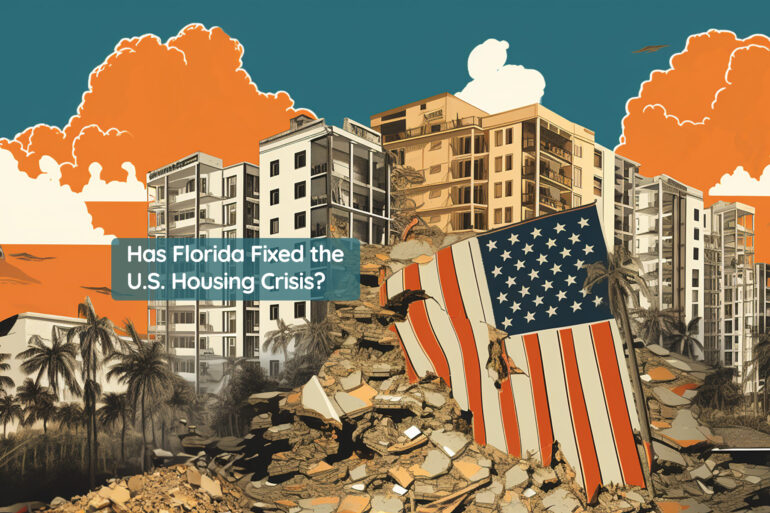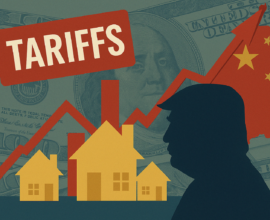Did Florida Find the Answer to the 2024 U.S. Housing Crisis?
The United States continues to face a housing crisis and it’s going to get worse in 2024. The lack of affordable homes in 2023 minimizes opportunities and puts families in danger of homelessness. A new program recently implemented by Florida’s government in 2023 and beyond aims to improve availability across the state. Could this be the answer?
Understanding the Ongoing Housing Crisis
It’s meant to increase the amount of affordable housing for employees with lengthy commutes, thanks to a lack of living options in the places where they work.
A lack of available and affordable homes remains prominent throughout the nation. However, there are no federal solutions that meet the needs of each state and municipality. Every area must find ways to accommodate citizens while attracting new residents. When homes are scarce, the population and economy suffer.
New home construction came to a practical standstill during the Great Recession. Between 2008 and 2018, builders supplied fewer houses than any other decade since the 1960s. This led to a shortage of more than 3 million homes by 2019.
Things got worse when the COVID-19 pandemic hit in 2020. Stay-at-home orders for nonessential services led to an extreme construction material and labor shortage. Without newly built homes, the demand for current houses and apartments skyrocketed with rent and home costs increasing. This led to the incredibly high home prices of 2021, 2022 and 2023.
A rise in interest rates turned people off from trying to purchase homes — especially new builds. Rent across the country became less affordable thanks to increased demand and landlords’ needs to support themselves during uncertain economic inflation, and keeping total debt below the recommended 36% of monthly income became very challenging.
Florida’s Live Local Act
The Live Local Act was signed into law in March 2023 and took effect in July. It’s a direct response to the lack of affordable housing for Florida workers. It will be in place until 2033.
Legislators describe it as a “comprehensive statewide workforce housing strategy.” It’s meant to increase the amount of affordable housing for employees with lengthy commutes, thanks to a lack of living options in the places where they work.
The act mandates that local governments permit multi-family homes for rent on mixed-use residential, commercial, or industrial sites if 40% of those homes will stay affordable for 30 years. The affordability calculation refers to people making up to 120% of the local area median income (AMI).
Full-time employees in the state at or below 150% of the AMI remain eligible for the Hometown Heroes program incorporated into the Live Local Act. The eligibility for that program is now income-based instead of occupation-based.
The city or county must apply the highest density allowed on any land within its jurisdiction for multi-family development. Buildings can have a maximum height for residential or commercial properties within a mile of the proposed location. However, municipalities must allow multi-family homes to be at least three stories.
While the Live Local Act has many supporters, some remain concerned about whether it will deliver its promised impact.
What Investors Should Know
There is an advantage for investors to jump into these new homes. Certain housing developments are eligible for a 75%-100% property tax exemption, depending on the units’ rent restriction. It applies to the 2024 tax roll, and you could get your structures certified by the Florida Housing Finance Corp. (FHFC) for consideration.
The tax exemptions covered by the Live Local Act also apply to construction materials with reimbursements allowing investors to earn a greater profit than they otherwise would.
There is no requirement to blend AMIs. A proposed development must still gain approval from local administrators and meet a county’s land development regulations. You should also consider reduced parking for any project within a half-mile of a major transit stop.
Criticism of the Live Local Act
While the Live Local Act has many supporters, some remain concerned about whether it will deliver its promised impact.
Critics argue that the act removes the municipalities’ autonomy by mandating that they comply with building new structures. They claim it allows special-interest groups to pass policy without advocating to the town or city.
The Florida Policy Institute lists the power dynamic between landlords and tenants as a primary concern. Without a Tenant Bill of Rights, guaranteed representation for eviction cases, and short notices to vacate a unit, some argue that the Live Local Act will harm renters’ rights more. The act does not allow voters to advocate for rent control in their municipalities.
The state remains first in the United States for rent-burdened tenants. Many spend more than 50% of their income on housing.
Critics also cite concerns around transparency with the Live Local Act exempt from the Florida Declaration of Rights.
How the Act Could Impact the Housing Crisis
Changes could mean a significantly larger average household income.
Since the act mandates municipalities approve more multi-family rental homes, more living spaces will be available. These new options can create competition, likely making them more affordable than they’re required to be.
Affordable housing could attract more people to Florida, providing an economic boost. Other states may incentivize residents to stay by offering more affordable housing. Over time, the country could see a reduced housing crisis.
The United States was one of the top countries that increased housing prices during the pandemic with Russia being the only other global superpower on the list. Finding methods to relieve its housing crisis could enable the U.S. to set a positive example for smaller countries trying to escape similar struggles. The Live Local Act could be a step in the right direction.
According to the National Low Income Housing Coalition (NLIHC), the U.S. would have had a 13.5% gross domestic product (GDP) between 1964 and 2009 if more affordable housing was available. Without change, the current housing crisis will increase that loss.
The lack of affordable housing costs the U.S. economy around $2 trillion each year since workers can’t advance their earnings by moving to more profitable locations. Changes could mean a significantly larger average household income. That would give residents more money to put back into the economy through consumerism and taxes.
Did Florida Solve the Crisis?
Only time will tell how large an impact the Sunshine State’s Live Local Act has on the future of the U.S. housing crisis. There is great potential for positive change, but valid concerns remain about whether the associated policies are good for the tenants that the new structures want to attract. If fairness and transparency are Florida’s priorities, the act could serve as a blueprint for other states to improve their markets.
Rose Morrison is the managing editor of Renovated, a home living site where she loves to give advice to help even the most novice of DIY-ers make their home their haven. She has written for publications such as NCCER, the National Association of Real Estate, and BioFriendly Planet. When she isn't writing, you'll find her baking something to satisfy her never-ending sweet tooth. For more articles from Rose, you can follow her on Twitter or subscribe to the Renovated.com newsletter








